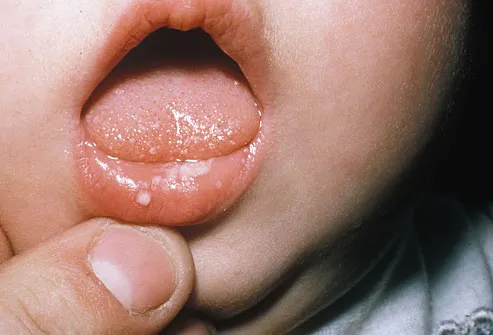 |
| From WebMD.com |
I did a quick search of the literature readily available and found quite a bit of information about HSV-1 transmission from mother to infant. Basically, if the mother of a newborn has an open herpes lesion on her breast she MUST avoid breastfeeding on that side because herpes is extremely dangerous for a newborn. However, there was very little available information about the transmission of herpes from baby to mother. I was able to find one instance where a 15 month old who was infected by his 5 year old sibling did, in fact, infect his mother. The mother in this situation did not previously have herpes simplex virus present in her system.
So I decided to check with some experts. I contacted Dr. Jack Newman, a Canadian pediatrician who is renowned for his work with breastfeeding mothers. I specifically asked him if the advice to wean was necessary or if the mother could perhaps nurse with a nipple shield. Here is his response:
I was truly grateful that he took the time to respond with such terrific advice. Needless to say I didn't suggest the nipple shield to the mother! In the meantime, I had also called my friend, Rebecca Saenz, MD, IBCLC, FABM - the only Breastfeeding Medicine physician specialist anywhere near us! Dr. Saenz was sweet enough to call me back and suggested that the mother ask the pediatrician for Zovirax, a cream form of Acyclovar, for the baby's cold sores. She said the mother could also use the cream if she developed any lesions, but that there is absolutely no need for this mother to wean.Indeed, it is very unusual for a baby to get an “adult” type of cold sore on his lip.Do you think a baby of 13 months of age would accept a nipple shield? In any case, if the baby has a herpes simplex cold sore, then it’s way past the time to prevent transmission to the mother’s nipples. That happened many days ago. She should continue breastfeeding. If she gets a feeling she is getting a herpes infection of the nipple(s), she should start acyclovir orally and continue breastfeeding.
What a blessing it is to have such terrific resources at hand. I am extremely thankful for both Dr. Newman and Dr. Saenz and the wisdom they bring to the practice of lactation consulting!




